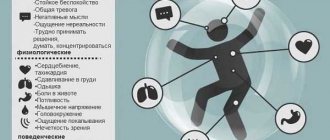What does it represent?
Rhabdophobia manifests itself primarily as an anxiety disorder. That is, the person becomes restless and cowardly, as he is in constant tension due to the expectation of punishment for an offense.
And if in childhood this anxiety is familiar to many, then in adults it is considered not particularly normal, which is why we can safely say that there is a phobic disorder.
The nervous system naturally becomes exhausted in this mode of life. Which leads to irritability, short temper, insomnia and even depression.
Symptoms
Behavioral
Rhabdophobes are characterized by excessive self-criticism. When it is within normal limits, it allows a person to become more conscious, it promotes him, develops him.
In this case, it does not bring any constructive solutions. But it only provokes the emergence of complexes, for example, inferiority, neuroses, depression and low self-esteem.
By the way, you will learn more about what depression is and what it threatens from this article.
The Phobe is constantly dissatisfied with himself, no matter what he does. If others praise him, he does not accept the praise, because he has a completely different opinion about why he managed to achieve positive results.
It is characterized by gloominess, nervousness, anxiety causes insomnia and health problems, not only mental, but also physical.
Everything that happens in life that is unpleasant gives meaning. For example, that the punishment for wrongdoing just finally came. Blames himself for any random events, even those to which he has nothing to do.
Somatic
When thinking about the upcoming beatings, a panic attack occurs. A person becomes so scared and anxious that his heart and stomach begin to ache, diarrhea, nausea, vomiting, dizziness or loss of consciousness occurs.
Blood pressure rises and heart rate accelerates. There is a catastrophic shortage of air, which “accelerates” the panic even more. After all, it seems that now he will suffocate due to breathing problems.
The face turns red because it makes you feel hot, you really want to go to the toilet, and you may experience tremors in your limbs. The gait becomes shaky and uncertain. A person in such a state does not really understand what he is doing, so he often finds himself in awkward situations.
For example, he cries or runs headlong somewhere, does not notice the door or other obstacles.
After a panic attack, you feel ashamed. This makes the guilt intensify, as does the anxiety that such “bad” behavior will certainly not be forgiven. And this provokes new attacks of insomnia, obsessive thoughts, and so on.
Fear of punishment ↑
In children
There is no such thing as a causeless fear of punishment in children. Parents are perplexed at such signs of their baby’s behavior. They don’t grab the belt during every conflict, they don’t scream, but the child is nevertheless afraid.
In such a situation, the reason often lies on the surface, and is not a secret behind seven seals:
- adults treat the little person too imperiously, even the slightest objections that could shake the foundations of parental authority are not allowed;
- Excessive demands are placed on the child: the fear of being unloved and rejected is instilled in the soul of a little person, and for him this seems to be the worst punishment;
- children with the so-called “innate intelligence” often experience the fear of punishment by parents; the discrepancy between temperaments and the level of communication culture often turns out to be far from being in favor of the parents; The life of a child with a refined psyche in an atmosphere of rudeness and a low level of culture turns into real torture.
In adults
This phenomenon is based on a common misconception that is common to most people. A person programs himself to the fact that any mistake is invariably accompanied by subsequent punishment.
There are two options for events arising from such a conclusion:
- You are in a state of anticipation of punishment for your mistake.
- You yourself punish your subordinates, relatives, colleagues. (The second case is always performed with much greater pleasure and success).
Fear of punishment binds a person with the bonds of lack of initiative and fear of a negative result when trying to independently solve any problem. Punishment, even theoretical, becomes dominant, determining the way of thinking and acting.
This behavioral model can rightfully be called an “ostrich” - head in the sand and no problems. For some reason, we forget that there is almost always a well-wisher who will, with great pleasure, give a kick to someone standing in such a position.
Our life usually plays the role of such a well-wisher, unforgiving of fear and apathy.
Causes
Childhood
The most common and quite logical reason for the development of rhabdophobia is directly cruel punishments for disobedience. Especially if they turned out to be unfair.
The child then does not understand why he was beaten and deprived of something, so he expects the situation to repeat at any moment.
After all, when you’ve done something wrong, then it’s clear that you did something wrong, and then a choice appears. Either refrain from committing an offense, or mentally prepare for the consequences.
Typically, harsh forms of punishment are practiced in dysfunctional families. For example, a father who was addicted to alcohol, during moments of intoxication, beat everyone who came to his hand until they lost consciousness.
Or the kid has done something and expects that everyone will find out and he will definitely get hurt.
But there is no retribution for the wrongdoing, nor is there any release. After all, it is not easy to live, every minute being ready to be exposed, and subsequently punished. The body cannot stand it and fails in the form of a disorder.
Injury
It happens that mastigophobia, also called the fear of spanking, arises due to the ridicule of classmates, which gradually develops into bullying.
That is, psychological or physical bullying, when a group of people, in particular children, consistently puts pressure on one person. Leading to nervous exhaustion, breakdowns, and in some cases to suicide attempts, which, unfortunately, are successful in most cases.
Also, any kind of conflicts with teachers, relatives, brothers and sisters have an impact.
For example, in sibling relationships (between children born of the same parents in the same family), it happens that the elders bully the younger ones.
They, wanting to feel their power over another person, intimidate him, threatening to tell their parents about some offense if they do not do as they are told.
In general, the younger one literally lives in constant fear, expecting betrayal, pain, and punishment. Due to some circumstances, he is unable to share his worries with his parents.
Most often, because adults do not believe, ordering them to obey those who are more experienced, or because they are not particularly involved in the lives of their children.
Therefore, attempts to find protection from them will be futile. Or rather, also with negative consequences for so-called sneaking.
Victim relationships
It happens that childhood passed relatively well, without pain and humiliation, but in adulthood a person ended up in a relationship with a tyrant or a perverse narcissist, in general, completely destructive. Destroying not only the personality, but also its health.
Let’s say there are often cases when a woman becomes a victim of domestic violence. A loving husband once raised his hand against her, then again and again, until it came to steadily manifesting violence.
She could have gotten a divorce in order to preserve her life and dignity. Only the psychological trauma that arose under such abnormal conditions will make itself felt as rhabdophobia.
A woman in other relationships will be on guard, expecting that at any moment a fist will fly in her direction due to bad weather or under-salted borscht.
You will learn more about victimization, that is, the tendency to sacrifice, and frequent getting into unpleasant situations from here.
Religiosity
In families where faith in God is more like fanaticism, adults are taught the knowledge that even the slightest negative thought will not go unnoticed. God sees everything, which means retribution is just around the corner.
But mental activity, as you yourself understand, is not so easy to control. Especially feelings.
And when someone in the class takes away a favorite thing and breaks it, a completely natural reaction to the violation of personal boundaries will be anger. Only it is a forbidden feeling, “bad”.
And it’s extremely difficult not to get angry. Of course, it can be suppressed, “stuck” somewhere else, but the very fact of its occurrence has already happened.
Accordingly, all that remains is to wait for illness and other failures for committing a sin - daring to experience irritation.
Impressionable individuals who have truly become fanatics, or have joined a religious sect, are at high risk of developing rhabdophobia.
Which is not surprising. The belief that there is someone watching every step can't help but cause concern. And, as you remember, this significantly depletes and deprives resources.
A lie for millions of lives
An eerie illustration of the distortion of information due to fear of punishment is the great Chinese famine of 1957-1961.
Then from 15 (according to official data) to 36 million people (according to unofficial data) died. The Chinese leader, following the Soviet model, decided to transform the largest agricultural country into an industrial power. Moreover, it was planned to switch to new rails in record time: “Three years of labor and hardship and a thousand years of prosperity!” They adopted both advanced Soviet experience - mass collectivization, ambitious targets, Lysenko's methods of “increasing productivity”, and their own know-how - the extermination of sparrows as the main pests of grain. All this coincided with extremely unfavorable weather conditions.
It was impossible to reach the planned targets, but people were afraid to signal the failure of the “Great Leap Forward”. Local party officials quickly realized that it was easier and safer to falsify indicators of labor achievements in order to obtain the intended results. Moreover, in 1958–1959, the more brutal the lie, the faster its author moved up the career ladder.
As a result, the great Mao was pleased - the harvests were “record.” On paper. The Chinese leader, proud of his political and economic decisions, is increasing grain exports and reducing acreage. And ordinary Chinese are dying of hunger. The 1960 harvest was 26% below the 1957 harvest, falling to 1950 levels. While China's population has grown by one hundred million people since 1950!
more details
Another important idea is that people make mistakes, and systems correct mistakes. That is why it is so important to have reliable information about what happened. In this context, the dialogue with a worker at the Pavlovsk bus plant is noteworthy. He was asked whether individual people should be punished for their defects. The worker answered firmly: “No. It's not fair. Many people make a mistake, but it could end with me, which means that only I will be punished.” The worker answered very wisely. In most cases, the occurrence of a defect is preceded by a whole series of events. And to fix the problem, you will have to understand the whole process. This is a systematic approach to errors.
Treatment
You should definitely see a psychotherapist. Living in constant fear is hellish torment. And you can get rid of them only by receiving outside support and qualified help.
It also helps to understand the reasons that provoked this fear, one’s reactions to stimuli, the presence of personal conflicts within, and so on.
The most commonly used methods for treating phobias are the Gestalt approach, hypnosis and cognitive behavioral therapy.
It is also important to seek advice from a psychiatrist. Who will be able to make an accurate diagnosis and prescribe the necessary medications.
For example, for depression and outbursts of aggression, or mood swings, sedatives and antidepressants are prescribed. If insomnia has brought you to exhaustion, take sleeping pills.
With an integrated approach, the phobe quickly returns to normal, copes with his emotions and relaxes. Gradually leaving behind previous fears and anxieties.










